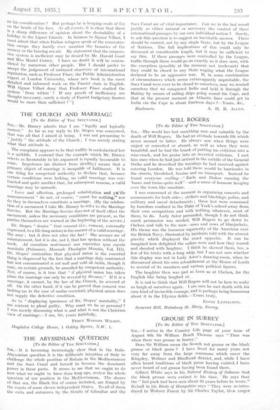THE CHURCH AND MARRIAGE
[To the Editor of THE SPECTATOR.] Sin,-111r. Binney admits that I am " legally and logically correct." As far as my reply to Dr. Stopes was concerned, that was all that I aimed at being. I was not presuming to
justify " the attitude of the Church ; I was merely stating what that attitude is.
The complaint appears to be that nullity in ecclesiastical law
is a quibble. I contend that the example which Mr. Binney selects as favourable to his argument is equally favourable to Mine. Impotence (as distinct from sterility) means that a Primary object of marriage is incapable of fulfilment. It is one thing for competent authority to declare that, because certain conditions were lacking, no valid marriage was con- tracted and quite another that, for subsequent reasons, a valid Marriage may be unmade.
" Love and affection, prolonged cohabitation and pat'Aic
announcement " do not, of course, " count for nothing," nor do they in themselves constitute a marriage. (By the celebra- tion of a sacrament I take Mr. Binney to ref( r to the Marriage Service. But the Marriage Service does not of itself effect the sacrament, unless the necessary conditions are present, as the Parties themselves are warned at the beginning of the service.) Dr. Stopes " denies " that consent (t.e., consent, externally expressed, to a life-long union) is the essence of a valid marriage. She may ; but it does not alter the fact ! She accuses me of Misstatement, but it is she, not 1, that has spoken without the boOk. Ad essentiam matrimonii non requiritur ipsa copula maritalis (Priimmer, Manuale Theologiae Moralis, Vol. III). Dr. Stopes' contention that physical union is the essential thing is disproved by the fact that a marriage duly contracted but not consummated is not null and void ab initio, though it inay, on certain grounds, be annulled by competent authority. Nor, of course, is it true that " if physical union has taken place the marriage can only be severed by divorce." If it is a marriage, it cannot, by the law of the Church, be severed at all. On the other hand, if it can be proved that consent was lacking (as in the case of undue coercion), physical union does not supply the defective condition.
As to " displaying ignorance of Dr. Stopes' mentality," I am content to plead guilty. Why must we be so personal ? I was merely discussing what is and what is not the Christian view of marriage.—I am, Sir, yours faithfully,
pmicv MARYON WILSON.
Magdalen College House, 1 Oakley Square, N.W. 1.


































 Previous page
Previous page